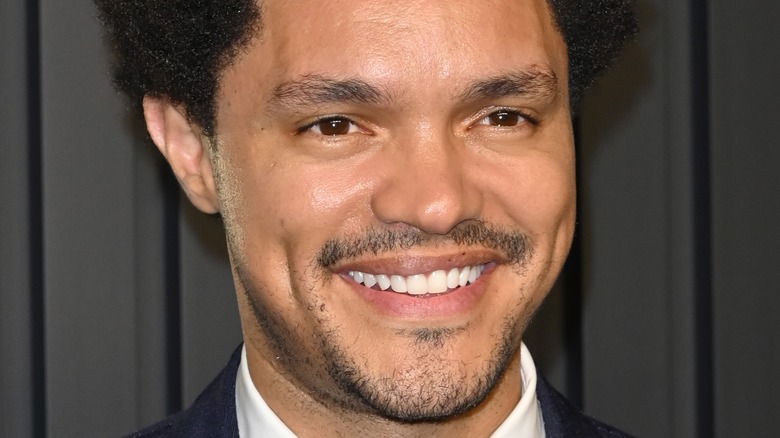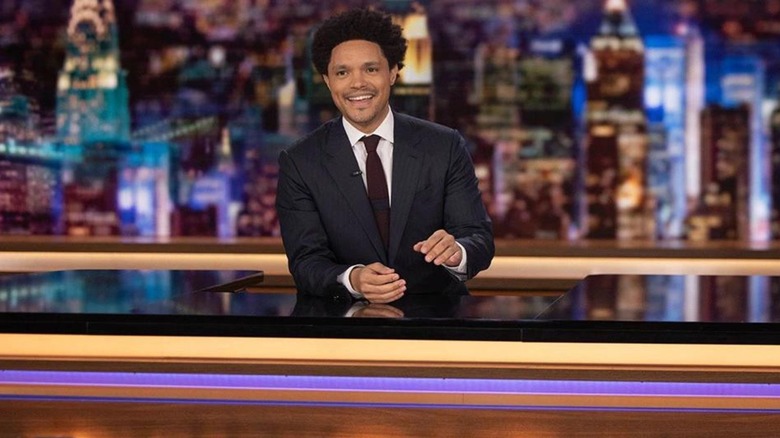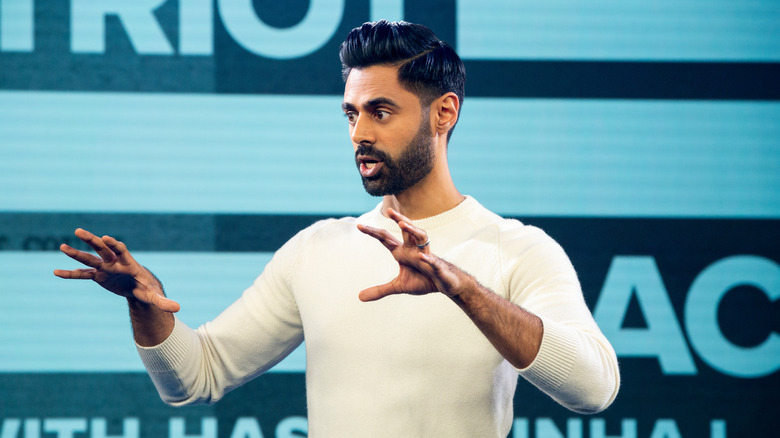How Do Ratings Play Into Trevor Noah's Exit From The Daily Show?
On February 10, 2015, Jon Stewart shocked the world when he announced — on air — that he would be leaving "The Daily Show" in less than a year's time. The announcement was surprising, not least of all because it was delivered in such a blunt, abrupt manner just months after Stephen Colbert's smooth, coordinated transition to CBS. With "The Colbert Report" gone, Stewart seemed — from December 2014 to February 2015 — to be the sole constant in the "Daily Show" universe. Then he left too and was somewhat surprisingly replaced by the young upstart comedian, Trevor Noah.
Now after six years with Noah behind the desk, longtime "Daily Show" fans once again find themselves in a state of disarray. On September 28, 2022, Noah, much like his predecessor, shockingly announced his departure — though this time, he kept it a secret from the show's creative team as well.
"I think I'd always hoped he was just the Energizer Bunny and would go on forever," said showrunner Jen Flanz, who'd been with the program since Craig Kilborn was the host (via the Hollywood Reporter). There were many different factors that led to Noah's decision, some of which fans will never be privy to. But where Stewart's program felt as if it could linger on indefinitely, the same was not true for Noah's. As the show's ratings make abundantly clear, many viewers have moved on from the long-running Comedy Central program before he will. The existential challenge "The Daily Show" faces in the wake of Noah's absence is not just finding a new host, but finding their lost audience.
Last year, The Daily Show's strongest asset was its online presence
Per Indie Week, Trevor Noah's "The Daily Show" averaged 372,000 viewers per night over the past year — compared to the 1.3 million nightly viewers received by Stewart during his final year. It can be tempting to draw the conclusion that Noah's program was floundering under his watch, but the truth is more complicated.
In an interview with The Hollywood Reporter, Noah, Flanz, and those in their circle spoke about the host's surprise exit. It's key to note here that Noah left on his own terms, to the extent that not even his producers were in the loop. Within the same interview, it's confirmed that Noah had a meeting with high-ranking Paramount executives who — in the face of Noah clearly looking for a way out of the show — spent said meeting trying to find a way to keep him involved, even in a reduced capacity. These facts don't align with the theory that Noah was pushed out or otherwise encouraged to leave due to low ratings, or even that those involved felt he was to blame for their decline.
In fact, as THR points out, Noah may be a more valuable asset than the show itself upon his exit. Across social media, Noah has drawn an astounding 1.8 billion views. The disparity between "The Daily Show" ratings and its star's social media stats represents a shift more existentially threatening to the program than Noah's departure: left-leaning viewers — especially younger, more diverse viewers — do not go to cable television for political commentary. They go to the internet.
Noah's peers thrive online
To better understand this shift, we have to look toward a few of Noah's contemporaries on the left, including a few "Daily Show" alum — starting, of course, with John Oliver.
After leaving his post as Senior British Correspondent in 2013, John Oliver began leading his own political talk show on HBO, titled "Last Week Tonight." Though the series debuted with 1.11 million views in 2014, it struggled to break a million nightly viewers by early 2015 — until Oliver's Edward Snowden interview went viral online. Despite being watched by less than 700,000 people on HBO, Oliver's 33-minute segment on "Government Surveillance" has amassed 36 million views on YouTube — becoming the first of many viral outings for "Last Week Tonight." The series held well above 1 million viewers for 13 consecutive episodes following the online debut of "Government Surveillance."
In the years that followed, the YouTube channel for "Last Week Tonight" would become a vital aspect of the show's cultural relevancy. Segments on President Donald Trump and televangelism would pull in close to 40 million views, while the show's coverage of Brexit would become — at one time — the single most shared clip on Twitter (per the London School of Economics and Political Science). In hindsight, it's hard not to see the show as unknowingly capitalizing on a burgeoning online space hungry for long-form educational content. By accident or on purpose, "Last Week Tonight" may have stumbled upon the future of political commentary.
The future is not always on streaming
In 2018 (the same year in which "Last Week Tonight" would defeat Noah's "Daily Show" at its first Emmy awards appearance) TV-land seemingly thought it understood the future of political talk shows as migrating toward digital, with Netflix giving "Daily Show" standout Hasan Minhaj his own program, "Patriot Act."
It's not hard to imagine television executives seeing streaming as the next logical step, but on a platform that thrives by providing viewers instant access to binge-able content, Minhaj's serialized current events program was always doomed to fail. It also underserved Minhaj's message by secluding behind a paywall of "volumes" released at intermittent periods throughout the show's run. When news broke, it was unrealistic to hope that Minhaj could cover it with the same immediacy and access that his peers would. The series lasted less than two years on Netflix — despite, again, receiving millions of views through online platforms like the "Netflix Is A Joke" YouTube channel.
Even Jon Stewart himself has struggled to build an audience with his streaming program. Returning to political commentary with Apple TV+'s "The Problem with John Stewart," Stewart fails to break even 100,000 viewers per episode (per The Wrap). If both cable and streaming are unable to secure an audience for these talk shows on their own, executives and even the hosts themselves may need to think more carefully about how they interact with online spaces — especially in a political climate flourishing online in inspiring and terrifying ways.
To succeed online, their content may need to adjust accordingly
While Noah's social media numbers are certainly impressive, his content output is out of step with modern trends. "The Daily Show" posts almost every single day on YouTube, overwhelming their audience with fleeting coverage of top stories and behemoth supercuts of popular segments and weeks of stories. In contrast, the weekly, focused videos of "Last Week Tonight" fit right in with YouTube's current fixation on "video essays." Noah posts a vaguely titled, 40-minute video summarizing the entire week one day, and a 90-second video about the Qatar World Cup the next. They hold view counts of 600,000 and 300,000 respectively. Oliver's own 20-minute commentary on the World Cup — his sole output for the week — has over 1.9 million views and is #4 on YouTube's trending page as of writing.
The most viewed video released by "The Daily Show" within the last year was one of Jordan Klepper's excellent man-on-the-street segments. Klepper's style of content also fits into the current YouTube landscape much in the same way Oliver's does. Where Oliver's peers may include fellow desk-men like Cody Johnston of "Some More News," Klepper's genre is dominated by Andrew Callaghan and the crew of "Channel 5." Though Callaghan began on YouTube, his success has since attracted the attention of HBO (via Variety). Meanwhile, Twitch's Hasan Piker drew one of the platform's largest audiences by doing interactive political commentary live for more than eight hours every day (via The New York Times).
The success of these creators proves that the internet has moved much of the political conversation away from traditional pundits and — for better and for worse — turned it over to the people. Anyone with a knack for agitative propaganda and photo-editing can create low-effort, "educational" memes that can spread reductive or even outright false information on a wide scale (via Axios). It makes sense then that punditry is perhaps at its most successful when engaging with the online space directly. In whatever state "The Daily Show" chooses to exist after Noah's exit, to focus solely on traditional ratings rather than fulfilling the potential of the show's online presence would be a mistake too obvious to forgive.




